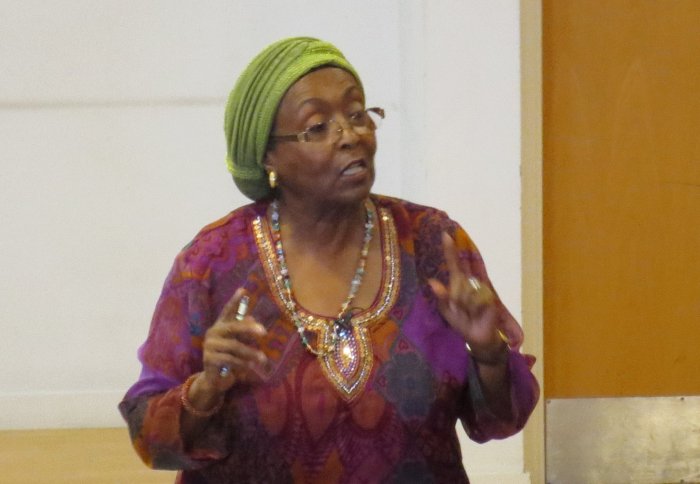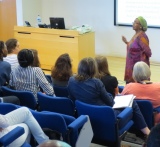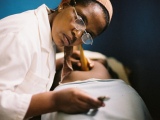Maternal care in Somaliland
by Jo Seed

IGHI welcomed special guest speaker, Edna Adan Ismail, who presented a seminar on the issues affecting maternal and child heath in Somaliland, Africa
 The Institute of Global Health Innovation (IGHI) was delighted to welcome Dr Edna Adan Ismail to Imperial last week for a seminar on maternal care and child health in her native Somaliland.
The Institute of Global Health Innovation (IGHI) was delighted to welcome Dr Edna Adan Ismail to Imperial last week for a seminar on maternal care and child health in her native Somaliland.
Edna was officially in London to speak and participate in the first Girl Summit, hosted by the UK government and UNICEF. The summit’s aim is to mobilise domestic and international efforts to end female genital mutilation (FGM) and child, early and forced marriage (CEFM) within a generation.
Edna has had a varied career as a nurse, midwife, UN diplomat, French Legion of Honour recipient and former foreign minister of Somaliland. In 2002, she even built her own hospital from scratch. This was to account for the lack of resources and trained health workers in Somaliland, mainly due to the civil war, which brought about the death or departure of nearly all of the country’s trained healthcare professionals.
Dr Ismail explained that in the whole of Somaliland, there are only 86 doctors, 369 nurses and 4 fully trained x-ray technicians, leaving the country with, among other problems, the highest rate of maternal and infant mortality in the world. For every 100,000 live births, 1,400 of them will be still born and a shocking 90 out of 1000 children will die before the age of 5. Sadly, 42 out of every 1000 new borns will die within the first month of life, whilst almost 4000 women will die each year in childbirth.
Edna explained that the country’s lack of infrastructure, including hospitals and the training of health workers, was mainly caused by the impacts and financial constraints brought about by war. If the cost of just one war tank at £9 million could be freed up to spend on healthcare for example, the country could build 20 hospitals. And that’s just from one tank.
As a result of war, poverty sets in, which then leads to a vicious cycle of ill health due to malnutrition, lower immune systems and poor sanitisation. The affects aren’t just physical either. The impact of war can lead to mental illness and addiction, which forms a never ending circle of poverty and neglect.
Rural Somalilanders also tend to live nomadic lifestyles, moving with their herds and the seasons, which makes it even more difficult to get the healthcare to the places it is needed the most.
Women’s health in Somaliland
 Women especially lack the sense of control over their own health, as any treatment they require, whether for a broken leg, or an emergency caesarean section, needs to be first approved by the man of the family (father, husband, brother or eldest son). This can prove difficult and even fatal in emergencies if the men are away or out of contact.
Women especially lack the sense of control over their own health, as any treatment they require, whether for a broken leg, or an emergency caesarean section, needs to be first approved by the man of the family (father, husband, brother or eldest son). This can prove difficult and even fatal in emergencies if the men are away or out of contact.
Women and girls are also at risk from the complications, both physically and mentally, of female genital mutilation (FGM). Throughout her career, Edna has witnessed hundreds of cases of FGM and has a long track record of trying to stop the practice. Her participation in the Girl Summit along with speakers including the UK prime minister David Cameron, girls education champion Malala Yousafzai and actress Freida Pinto, helped bring together campaigners, policymakers and development professionals, from around the world, to a school in south London to discuss these very issues.
Tackling the problem head on
After retiring from the World Health Organization (WHO) in 1997, Edna dedicated herself to building the Edna Adan University Hospital. The hospital seeks to fill not only the urgent need for healthcare but also to provide - in collaboration with the Ministry of Health, UNICEF, and WHO - training for a new generation of nurses and midwives qualified to provide reproductive healthcare throughout the Somaliland region.
Another aspect of the hospital's mission is to combat the practice of FGM, which is endemic to the region. Mothers of newborn girls are counseled on the dangers of having their child circumcised, but the tradition is strongly ingrained in the culture.
Education is one of the strongest gifts we can give to a human being and particularly to a woman in Africa. We shouldn’t ever underestimate the capacity of a human being who is determined to do something. If I at 60 could build a hospital, then anybody can do it”.
– Dr Edna Adan Ismail
Dr Ismail said “I was delighted to be offered the opportunity to talk to Imperial staff and students on the healthcare challenges affecting Somaliland today and I hope that it has inspired listeners to actively take part in the fight against FGM and CEFM in Africa. Education is one of the strongest gifts we can give to a human being and particularly to a woman in Africa. We shouldn’t ever underestimate the capacity of a human being who is determined to do something. If I at 60 could build a hospital, then anybody can do it”.
Dr Lesong Conteh, Senior Lecturer in Health Economics from the School of Public Health at Imperial and the person who invited Edna to speak said “We were delighted to host Dr Ismail and to hear such an inspiring and thought provoking seminar. Edna demonstrates how one person’s passion, determination and commitment can improve the lives of so many”.
Article text (excluding photos or graphics) © Imperial College London.
Photos and graphics subject to third party copyright used with permission or © Imperial College London.
Reporter
Jo Seed
Institute of Global Health Innovation